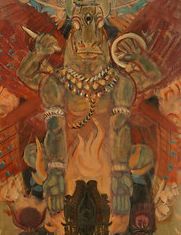|
Home
|
Feb 3, 2020
This week’s themeWell-traveled words This week’s words Moloch bezoar cavalcade saber-rattling calash 
Study for Moloch (detail), 1895
Art: John Singer Sargent Previous week’s theme Words about books A.Word.A.Day
with Anu GargLast year, when I was visiting India, one morning I went out for groceries in Mumbai. I was taking in sights and sounds when a shopkeeper picked an apple from his basket, sliced it, and offered it to me for tasting. “Washington apple!” he said. I smiled. I told him that I lived in Washington* and we chatted for a few minutes. I marveled at how economics have changed. Somehow, it’s still profitable to sell an apple brought in from 8,000 miles away. Somehow, it’s still profitable to grow and send an apple that far. Most amazingly, the same apple can be sold profitably both by a shopkeeper with a rickety basket (net worth $100) and by a storeowner with a high-tech store (net worth $100+ billion).** Fruits travel thousands of miles to land on our plates, but none has traveled as widely to reach us as the apricot. It took the scenic route to travel from Latin to Greek to Arabic to Spanish/Portuguese to French, before reaching dining tables of the English language. This week we’ll look at five other terms that have traveled widely before reaching the English language.
*The good Washington, not the one that’s currently the home of the orange
monster. We are Washington state. That one is Washington, DC.
**In the latter case, you pick the apple from the high-tech basket and leave -- the basket magically takes money from your purse and puts the change back. Save time and money! Impressive, but you miss out on talking with the storeowners, exchanging stories with them. With money you can buy apples, you can even buy stores, but you cannot buy stories. I was in a musical instruments shop in Haridwar, a city in north India. It was a low-tech place (no credit cards) to say the least, but when the owner found out I lived in America, he told me about his son who was obsessed with an American “company”. “Which one?” I asked. “NASA.” He told me the kid one day hoped to work for them and go visit other planets. Moloch
PRONUNCIATION:
MEANING:
noun: Someone or something to which extreme sacrifices are made.
ETYMOLOGY:
After Moloch, a Canaanite god of the Bible, associated with the practice
of child sacrifice. From Latin Moloch, from Greek Molokh, from Hebrew
Molekh, from melekh (king). Earliest documented use: 1615. Moloch has turned
into a verb as well: molochize.
USAGE:
“Sacrifice all to the Moloch of convenience and you might end up on the
altar, too.” Jon Talton; If Amazon Go Technology Goes Big, Grocery Workers May Get the Sack; The Seattle Times (Washington); Dec 7, 2018. A THOUGHT FOR TODAY:
Writers, like teeth, are divided into incisors and grinders. -Walter
Bagehot, journalist and businessman (3 Feb 1826-1877)
|
|
Subscriber Services
Awards | Stats | Links | Privacy Policy
Contribute | Advertise
Awards | Stats | Links | Privacy Policy
Contribute | Advertise
© 1994-2026 Wordsmith